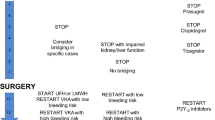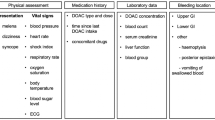Abstract
Purpose
To identify the practices of ophthalmologists when undertaking glaucoma surgery on patients concurrently using warfarin or acetylsalicylic acid (aspirin).
Methods
A questionnaire was designed to examine perioperative management of patients being treated with warfarin and aspirin prior to and during glaucoma surgery. The questionnaire was posted with stamped self-addressed envelopes to all glaucoma specialists registered on a glaucoma shared care scheme database.
Results
Of the 93 eligible participants, 64 returned a completed questionnaire, representing a response rate of 68.8%. Twenty-one surgeons (32.8%) routinely stopped warfarin before surgery. Mean time prior to surgery of drug cessation was 4 days (range 2–7). Three surgeons (14.3%) routinely commenced heparin if they stopped warfarin. Ten (47.6%) never used heparin, while the remaining eight (38.1%) would use heparin depending upon the indication for anticoagulation. Forty-two surgeons (81.25%)were happy to operate only at an INR ≤3 at the time of surgery. The remainder (18.75%) were happy to operate at higher INRs, including two surgeons (3.1%) who would operate at any level. Twenty surgeons (31.2%) routinely stopped aspirin before surgery, while the rest did not. Of those who stopped aspirin, the mean time prior to surgery was 7.1 days (range 4–14 days).
Conclusions
The majority of surgeons do not stop warfarin or aspirin prior to glaucoma surgery. There is a great diversity in current practice with regard to the management of anticoagulant therapy prior to glaucoma surgery amongst glaucoma surgeons in England. Currently there is little information available to offer definitive guidance.
Similar content being viewed by others
References
The Medical Research Council’s General Practice Research Framework (1998) Thrombosis prevention trial: randomised trial of low-intensity oral anticoagulation with warfarin and low-dose aspirin in the primary prevention of ischaemic heart disease in men at increased risk. Lancet 351(9098):233–241
Antithrombotic Trialists’ Secretariat (2002) Collaborative meta-analysis of randomised trials of antiplatelet therapy for prevention of death, myocardial infarction, and stroke in high risk patients. BMJ 324(7329):71–86
Quaranta L, Bettelli S, Uva MG, Semeraro F, Turano R, Gandolfo E (2003) Effect of Ginkgo biloba extract on preexisting visual field damage in normal tension glaucoma. Ophthalmology 110(2):359–362 discussion 362–3644
Baron JA, Cole BF, Sandler RS, Haile RW, Ahnen D, Bresalier R et al (2003) A randomized trial of aspirin to prevent colorectal adenomas. N Engl J Med 348(10):891–899
Parkin B, Manners R (2000) Aspirin and warfarin therapy in oculoplastic surgery. Br J Ophthalmol 84(12):1426–1427
Konstantatos A (2001) Anticoagulation and cataract surgery: a review of the current literature. Anaesth Intensive Care 29(1):11–18
Ong-Tone L, Paluck EC, Hart-Mitchell RD (2005) Perioperative use of warfarin and aspirin in cataract surgery by Canadian Society of Cataract and Refractive Surgery members: survey. J Cataract Refract Surg 31(5):991–996
Narendran N, Williamson TH (2003) The effects of aspirin and warfarin therapy on haemorrhage in vitreoretinal surgery. Acta Ophthalmol Scand 81(1):38–40
Cobb CJ, Chakrabarti S, Chadha V, Sanders R (2007) The effect of aspirin and warfarin therapy in trabeculectomy. Eye 21(5):598–603
Bell NP, Orengo-Nania S, Pietz K, Gross RL (2004) Aspirin use in advanced uncontrolled glaucoma. J Glaucoma 13(5):365–370
Fraser SG, Wormald RP (2008) Hospital Episode Statistics and changing trends in glaucoma surgery. Eye 22(1):3–7
Grip L, Blomback M, Schulman S (1991) Hypercoagulable state and thromboembolism following warfarin withdrawal in post-myocardial-infarction patients. Eur Heart J 12(11):1225–1233
Dahlmann AH, Mireskandari K, Cambrey AD, Bailly M, Khaw PT (2005) Current and future prospects for the prevention of ocular fibrosis. Ophthalmol Clin North Am 18(4):539–559
Sii F, Todd B, Shah P, Chiang M (2006) Reduction of anterior-segment vascularity with preoperative topical apraclonidine 1%. J Cataract Refract Surg 32(4):692–693
Konstas AG, Jay JL (1992) Modification of trabeculectomy to avoid postoperative hyphaema. The ‘guarded anterior fistula’ operation. Br J Ophthalmol 76(6):353–357
King AJ, Rotchford AP, Alwitry A, Moodie J (2007) Frequency of bleb manipulations after trabeculectomy surgery. Br J Ophthalmol 91(7):873–877
Gore-Felton C, Koopman C, Bridges E, Thoresen C, Spiegel D (2002) An example of maximizing survey return rates. Methodological issues for health professionals. Eval Health Prof 25(2):152–168
Author information
Authors and Affiliations
Corresponding author
Appendix
Appendix
Anticoagulation in glaucoma surgery questionnaire
Postcode of hospital (1st half): ________________
Q1: How many glaucoma surgeries do you perform per year?____________
__________ % Trabeculectomy ___________ % Non-penetrating
Q2: a) Do you routinely stop Warfarin treatment before trabeculectomy? Y / N
If so how far in advance? ________ days Why?______________
b) Do you liase with a haematologist about stopping Warfarin?
Y / N / Dependant on reason for Warfarin
Reasons warranting haematology consultation (please circle all that apply):
AF / DVT / PE / Porcine Heart Valve / Metal Heart Valve
c) Do you liase with the patients GP about stopping their Warfarin?
Y / N / Dependant on reason for Warfarin
Reasons warranting GP consultation (please circle all that apply):
AF / DVT / PE / Porcine Heart Valve / Metal Heart Valve
d) If you stop Warfarin do you use IV heparin instead?
Y / N / Dependant on reason for Warfarin (go to 2e)
e) What conditions do you consider warrant IV heparin instead of Warfarin?
AF / DVT / PE / Porcine Heart Valve / Metal Heart Valve
(please circle all that apply)
f) In patients on Warfarin (whether you’ve stopped it or not) when do you check the INR (please circle all that apply):
The day of operation / 1 week before / 2 weeks before
Q3: a) Do you routinely stop Aspirin before trabeculectomy? Y / N
If so how far in advance? ________ days Why? _______________
b) Do you liase with the patients GP about stopping their Aspirin?
Y / N / Dependant on reason for Aspirin (go to Q3c)
c) Reasons warranting GP consultation before stopping Aspirin:
AF / DVT / PE / History of CVA / History of TIA
IHD / History of MI
Q4: At what INR would you be unhappy proceeding to surgery (please circle)?
>1.0 >1.5 >2.0 >2.5 >3.0 >3.5 >4.0 Happy at any INR
Q5: a) Do you recall your last haemorrhagic complication following trabeculectomy?
Y / N / Never had a haemorrhagic complication
b) If so – was the patient on (please circle):
Warfarin / Aspirin / Both Aspirin and Warfarin / None /
Clopidogrel
c) If the patient was on Warfarin did you stop it pre-operatively Y / N
How many days pre-operatively? _________ days
Did you check the INR? Y / N When? ___ days pre-op
INR was ________ (approx figure fine – leave blank if cannot recall)
d) If the patient was on Aspirin did you stop it pre-operatively Y / N
How many days pre-operatively? _________ days
e) What was the complication (please circle all that apply):
Excessive Peroperative Haemorrhage
Post-operative Hyphaema
Post-op sub-conj Haemorrhage
Supra-Choroidal Haemorrhage
Bleed under flap or at ostium
Other:___________________________
f) How did you manage this complication?
Expectant / Active
Surgical revision / tPA injection / AC washout
Other: ________________________________________
Q6: a) Do you recall the last patient you operated upon on Warfarin? Y / N
b) Is this patient the same as the one described above? Y / N
If yes please skip this question (go to Q7)
c) Did you stop the Warfarin pre-operatively Y / N
d) If yes how many days pre-operatively? ________ days
e) Did you check the INR? Y / N
INR was ________ (approx) at time of surgery
f) Was there excessive bleeding per-operatively Y / N
g) Was there any post-operative haemorrhagic complication Y / N
If so what complication (please circle all that apply):
Excessive Peroperative Haemorrhage
Post-operative Hyphaema
Post-op sub-conj Haemorrhage
Supra-Choroidal Haemorrhage
Bleed under flap or at ostium
Other:________________
h) How did you manage this complication?
Expectant / Active
Surgical revision / tPA injection / AC washout
Other: ________________________________________
Q7: Have you carried out a trabeculectomy upon a patient on Clopidogrel?
Y (go to Q7a) / N (go to Q7b)
a) Did you stop the drug? Y / N
How long before surgery: _______ days
Was there excessive per-operative bleeding? Y / N
Were there any post-operative bleeding complications? Y / N
What was the complication: ________________________
b) If you operate on someone on Clopidogrel do you intend to stop the drug? Y / N
If so how long before surgery: _______ days
Comments:
Rights and permissions
About this article
Cite this article
Alwitry, A., King, A.J. & Vernon, S.A. Anticoagulation therapy in glaucoma surgery. Graefes Arch Clin Exp Ophthalmol 246, 891–896 (2008). https://doi.org/10.1007/s00417-008-0792-9
Received:
Revised:
Accepted:
Published:
Issue Date:
DOI: https://doi.org/10.1007/s00417-008-0792-9




